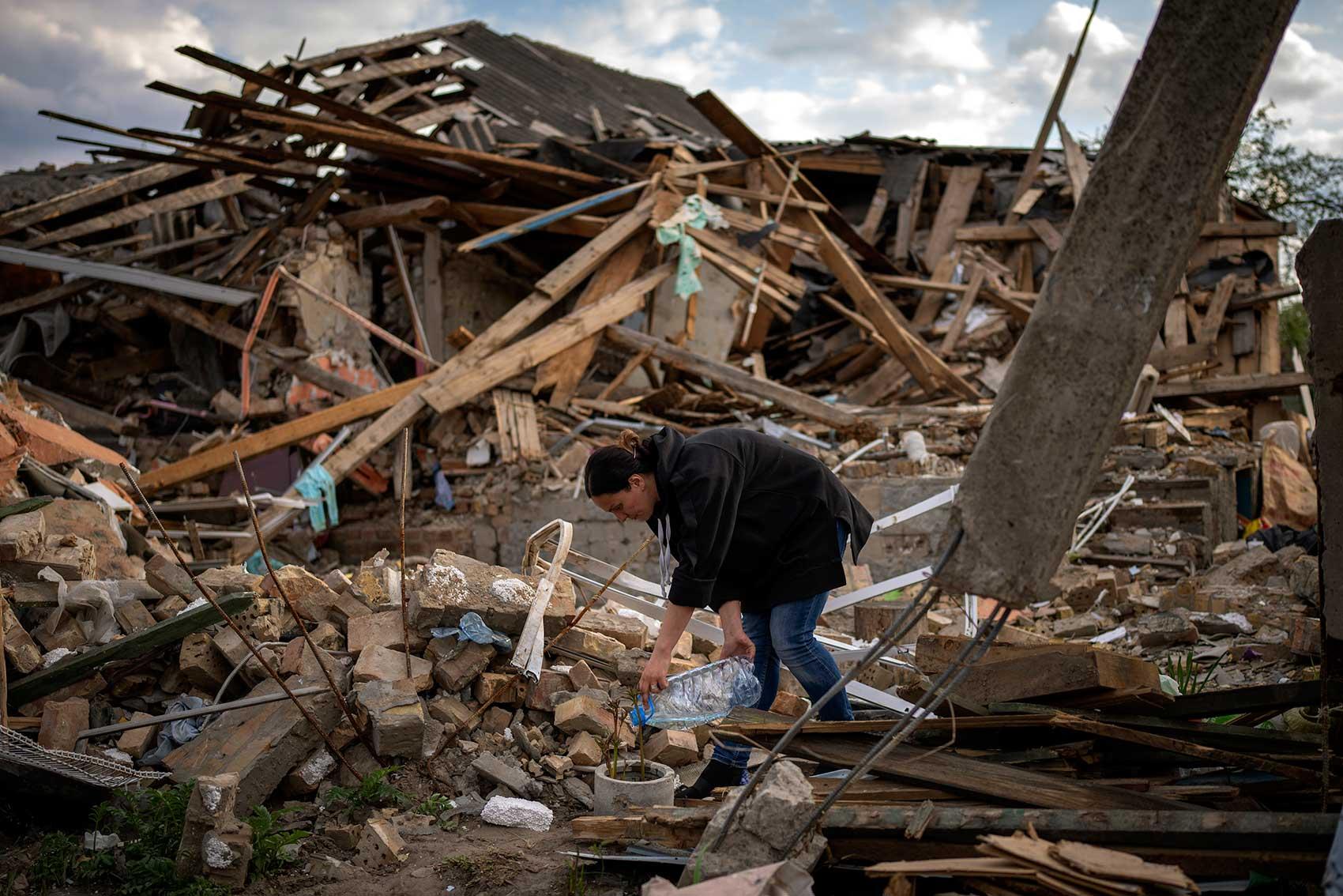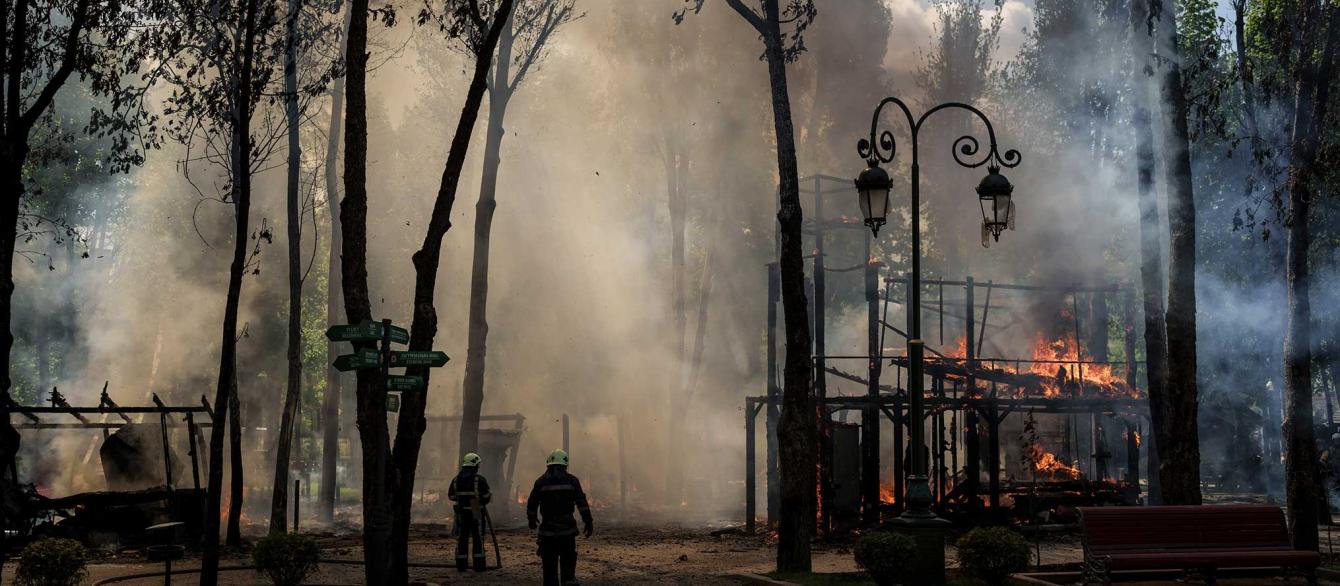Russian President Vladimir Putin has repeatedly invoked World War II when justifying the invasion he launched of neighboring Ukraine 10 weeks ago. For the Russian public, the Soviet victory over Germany in 1945 remains a source of immense pride. Putin’s allusions to that event have helped him bolster public support for his latest war. He has claimed, for example, that Ukraine is ruled by Nazis and that soldiers of the Russian army are seeking to “de-Nazify” Ukraine and defend the Russian homeland against nefarious external forces.
Putin’s assertions about Nazis in Kyiv are baseless, but there are striking analogies between the way the USSR’s Red Army operated during World War II and the way the Russian army is operating currently against Ukraine. These analogies, far from reflecting favorably on either the Red Army or today’s Russian army, underscore the deeply immoral nature of Russia’s war in Ukraine.
Aggression and resistance
World War II began for the Soviet Union in September 1939 when the Red Army marched into eastern Poland and sought to overthrow the government and dismember the country in collusion with Nazi Germany, which occupied western Poland. Soon thereafter, Soviet forces moved into Finland, seeking to take it over. In both Poland and Finland, the Red Army encountered fierce resistance.
A similar pattern has been evident in Russia’s war against Ukraine, which began in late February, when the Russian army moved in from several directions and sought to overthrow the government and dismember the country. The resistance in Ukraine to the Russian army’s invasion in 2022 has been just as ferocious as the armed opposition the Red Army faced in 1939 when it invaded Poland and Finland.

Anna Shevchenko, 35, waters the few flowers that survived in the garden of her home in Irpin, near Kyiv, on Tuesday, May 3, 2022. "It is new life," she said. The house was almost completely destroyed by bombing in late March during the Russian invasion of Ukraine.
Gratuitous brutality toward civilians
The Red Army engaged in rampant atrocities and massacres during its occupation of eastern Poland, Finland and other East European countries in 1939-1941, and Soviet troops also behaved with indiscriminate cruelty against civilians during sweeps through Eastern Europe in 1944-1945.
Scenes nowadays from Bucha, Mariupol, Kharkiv and other Ukrainian cities show that Russian soldiers over the past 10 weeks have perpetrated atrocities and massacres against civilians in Ukraine. Putin has awarded medals of honor to Russian army units that have been implicated in horrendous abuses, just as Soviet leaders did with Red Army forces during World War II.
Rape as a tool of warfare
Soviet soldiers were notorious for raping women in the territories they occupied during and immediately after World War II. When Joseph Stalin learned that his soldiers were engaging in mass rape in occupied areas, he made light of it, saying that they were merely “having a little fun.”
In Ukraine over the past several weeks, Russian soldiers have earned a similar reputation by engaging in widespread rape, and leaders in the Kremlin once again view the practice with equanimity and have made no effort to curtail it. When Putin’s press secretary, Dmitry Peskov, was asked about sexual crimes perpetrated by Russian soldiers in Bucha, he replied that the accusations were mere “lies” and “fabrications.”
Soldiers as cannon fodder
Throughout World War II, Stalin showed almost no regard for the lives of his own soldiers. During the Battle of Kyiv in the late summer of 1941, Soviet military commanders pleaded with Stalin to order a strategic retreat. Stalin rejected their entreaties and demanded that they remain in their positions. German Wehrmacht units who had surrounded the Red Army forces moved in and annihilated several hundred thousand. Despite this appalling and unnecessary loss of life, Stalin continued to pursue the war in a way that gave low priority to saving his own soldiers’ lives.
Similarly, in late February and March 2022, when Russian soldiers were sent into Ukraine, they were not told they were entering a war zone. They thought their units were merely engaging in exercises, and they were shocked to find themselves under deadly fire from a formidable adversary. The resulting high rate of casualties among Russian troops — already far more than the number of Soviet soldiers killed during nine years of fighting in Afghanistan in the 1980s — is one of the reasons that the morale of Russian soldiers has been so low. Before the war, Putin repeatedly pledged that no conscripts would be sent to Ukraine, but in fact, many conscripts have been deployed to Ukraine from the very start, becoming cannon fodder.

Captured Russian soldiers answer media questions at a press conference in the Interfax news agency in Kyiv, Ukraine, March 5, 2022.
Mass looting
The millions of Soviet soldiers who swept into Eastern Europe and Germany in 1943-1945 dismantled and took with them almost anything of value they could find. The looting became so frenzied at times that it kept the Red Army from fulfilling some of its missions. The seizure of war booty by Soviet troops was often chaotic but was condoned by Soviet military commanders. As the fighting was drawing to a close in 1945, Soviet leaders adopted an official program of mass looting, which they called reparations.
In 2022, Russia’s invasion of Ukraine has again been conducive to mass looting. Even Russian soldiers who regret being sent to Ukraine have used the opportunity to cart off televisions, washing machines, computers, video game portals, microwave ovens, clothes, and other goods, including some of dubious value. Conscripts and professional soldiers alike have engaged in the looting. Because living standards in Russia are generally higher on average than in Ukraine, one might wonder why Russian troops would feel the need to steal so much. Evidently, Russian military culture encourages the practice, just as Soviet military culture did during World War II.
This coming Monday, Putin will officially commemorate the 77th anniversary of the Soviet and Allied victory over Germany. He will undoubtedly boast of parallels between the Red Army eight decades ago and the Russian army today. He is right that there are parallels, but the examples he will cite will be spurious. The real parallels are ones he will sedulously ignore.
This article originally appeared on WBUR Cognoscenti on May 4, 2022.






